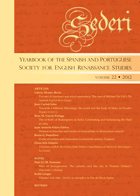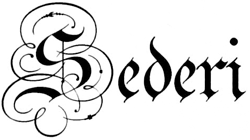
Sederi 22
Sederi 22 — 2012
EDITORS
Berta Cano Echevarría & Ana Sáez-Hidalgo
REVIEW EDITOR
Francisco J. Borge López
ISSN 1135-7789
Joan Curbet Soler, “Towards a Miltonic Mariology: the word and the body of Mary in Paradise Regain’d (1671).” SEDERI 22 (2012): 29-50.
DOI: https://doi.org/10.34136/sederi.2012.2 Download PDF
Abstract
It is a recurring critical topos that John Milton’s Paradise Regain’d (1671) is a revisionist poem, one that works towards reframing and redefining the epic tradition; what has certainly been less noticed is the central function played by the character of Mary, the mother of Christ, in this revisionist process. This article will try to prove that Mary’s appearances in the poem are, though limited, essential to its content and to its perspective on the interrelated subjects of the revelation of God in history and the individual confrontation with historical forces; and it will try to do so by bringing together theological discussion and a gender-oriented approach. There have certainly been approaches to Paradise Regain’d that have explored some of the gender issues brought about by the poem’s modification of the heroic function: almost unanimously, these approaches have concentrated on the character of the Son. My intention here, however, is another: I will try to show how the function and voice of Mary in the poem set in motion a complex, rich network of implications (both ethical and theological) which are at the core of the poem’s discourse and ideology. This focus on the maternal in Paradise Regain’d will not be carried out from a psychoanalytical perspective (though it is by no means incompatible with such an approach), but rather through reading the text via literary and theological categories that are recurrent throughout Milton’s work. It should thus be possible to start working seriously towards establishing the presence of a serious and original Mariology (clearly not a Mariolatry) in Milton’s last epic poem. Overall, this will lead us to a reconsideration of Paradise Regain’d as an essentially innovative text, and one which is strongly heterodox in terms of its theology and gender discourse.
Keywords: Gender; motherhood; selfhood; epic.
References
Calvin, John 2008. Institutes of the Christian Religion. Trans. Henry Beveridge. Massachusetts: Hendrickson Publishers.
Condee, Ralph W. 1970. “Milton’s Dialogue With the Epic: Paradise Regain’d and the Tradition.” Yale Review 59: 357-375.
Corns, Thomas N. 2003. “With Unaltered Brow: Milton and the Son of God.” Milton Studies 42: 106-109.
Fallon, Stephen 2007. Milton’s Peculiar Grace: Self-representation and Authority. Cornell University Press: Ithaca and New York.
Fish, Stanley 2002. How Milton Works. Cambridge, Massachusetts and London: Harvard University Press.
Foucault, Michel 1978-1984. Histoire de la Sexualité, I-III (La Volonté de Savoir/ L’Usage des Plaisirs/Le Souci de Soi). Paris: Gallimard.
Gambero, Luigi 1999. Mary and the Fathers of the Church. San Francisco: Ignatius Press.
Hadot, Pierre 1989. Michel Foucault, Philosophe. Paris: Éditions du Seuil.
Lactantius 2007 (1886). “The Divine Institutes.” Eds. Alexander Roberts, James Donaldson and Arthur Cleveland Coxe. The Ante-Nicene Fathers vol. VII. New York: Cosimo: 9-327.
Langford, Thomas 1982. “The Nature of Christ in Paradise Regain’d.” Milton Quarterly 16: 63-67.
Lewalski, Barbara 1975. “Theme and Structure in Paradise Regain’d.” Studies in Philology 57: 186-220.
Martz, Louis L. 1980. Milton: Poet of Exile. New Haven and London: Yale University Press.
Milton, John 1992. Complete Poems, Of Education, Areopagitica. Ed. Gordon Campbell. London: J. M. Dent and Sons.
Owen, John 1967 (1671). “Animadversions Against a Treatise Called Fiat Lux (1671).” Ed. William H. Goold. Works of John Owen vol. XIV. Edinburgh: Banner of Truth: 318-326.
Pelikan, Jaroslav 1996. Mary through the Centuries: Her Place in the History of Culture. Belknap: Harvard University Press.
Poole, Matthew 1963 (1685). A Commentary on the Holy Bible. Edinburgh: Photographic Reproduction printed by Banner of Truth.
Tertullian 2007 (1885). “The Five Books Against Marcion.” Eds. Alexander Roberts, James Donaldson and Arthur Cleveland.The Ante-Nicene Fathers vol. III. New York: Cosimo.
Wayne, Don E. 1984. Penshurst: The Semiotics of Place and the Poetics of History. Madison: University of Wisconsin Press.
